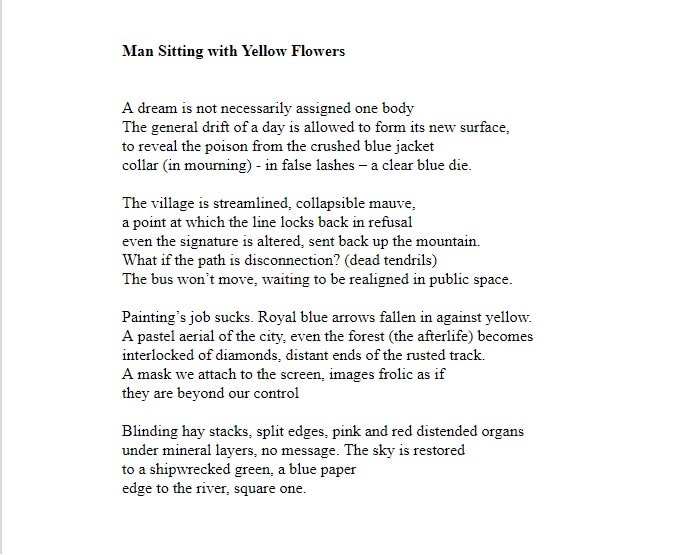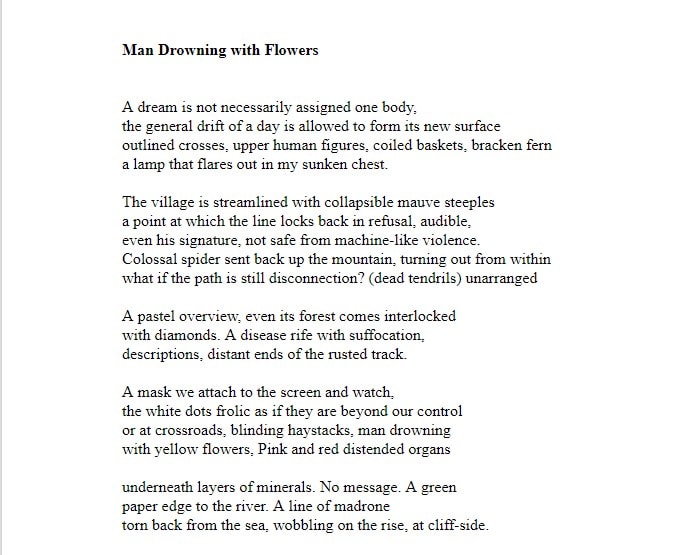

How do poems enter the world? Through the fog of dreams or the impossible swelter of waking life? In Cedar Sigo’s poetry, the answer lies somewhere in between. His work locates the reader in a richly-layered landscape all its own, where consciousness always appears on the brink.
Here, Sigo offers a collage-like portrait of a man sitting—or is he drowning? I asked him where his poems come from, and we quickly began discussing his own origins: what it was like to study with Joanne Kyger (she wasn’t big on revision) and how it feels to move back home to the reservation where he grew up.
– Ben Purkert for Guernica
Guernica: What an amazing opening line (“A dream is not necessarily assigned one body”). How did it come to you?
Cedar Sigo: I was reading an interview with Diane Di Prima where she said, on the night of Robert Duncan’s death, the great magical poet of San Francisco, she felt like she had dreamt his dream, that in his departure this dream chose her body in order to continue. So I got to thinking about that and also my own dream life.
Guernica: Are you one of those people who always remembers dreams?
Sigo: I wish! I’m so jealous of them. If people ask me about my dreams, I usually can only remember a tiny fragment and nothing else. But it’s great, because I feel like not-knowing is the dream. That’s the open chamber I go into in writing. When I’m revising, the process is very different. I tend to test out lines, one by one. It’s like tying a tightrope to see how much weight it can withstand. Seeing if it can bear the whole weight of the poem.
Guernica: I love that. It reminds me of Ferlinghetti’s metaphor comparing the poet to a high-wire acrobat “constantly risking absurdity / and death.”
Sigo: Absolutely. And it really is about risk. People think poetry is like needlepoint. Like you’re sitting quietly in the corner somewhere. They don’t understand that there’s risk in taking on the poem. It takes a long time to get it right. I’ll be kept up at night by three lines that are unsettled. Or if there’s a hole in the poem that needs to be filled. Or if there are things that need to be edited to get the right architecture.
Guernica: What do you mean by architecture, exactly?
Sigo: It depends. Sometimes it’s about working with the syllables to shape how the language is received. Sometimes it’s about making the poem more concrete by adding solid images. You see in the final draft how the “colossal spider” shows up?
Guernica: Yeah, I was going to ask about that monster.
Sigo: It’s a device. It’s necessary to hold the poem down. To hold that stanza down. Otherwise the whole thing would collapse as you move through it. It’s important to have something large and tangible there.
Guernica: I think the spider’s appearance also changes the tone. The final draft seems more ominous, particularly going from “Sitting” to “Drowning.”
Sigo: That’s what I wanted. Not a happy still-life painting, but something darker. It’s truer of these times when the Earth is circling the drain.
Guernica: Is that what brought you to poetry in the first place? A desire to reflect the times?
Sigo: I’m honestly not sure. I began writing poetry because of Langston Hughes. He was the first poet I can remember liking. It felt like he was talking to me on equal footing. No exalted language or if it became exalted it was usually in the service of an end rhyme. But then, later on, it was reading the biography of Allen Ginsberg. Not because I was in love with his poetry, but more his being shamelessly queer and not feeling the need to give anyone an explanation about how he lived his life. But early on I felt he needed an editor. I was twenty when I was reading him. You remember how evil you are when you’re twenty? You’re critical of all your heroes, all your teachers, even though you haven’t done anything yourself.
Guernica: One of your teachers was Joanne Kyger, right?
Sigo: It’s funny you mention her. She was always telling me not to edit.
Guernica: Oh?
Sigo: Well, I didn’t take it to mean never revise. I think her point was about not handling material prematurely. After you get one draft, maybe close the notebook and come back tomorrow and then see. Don’t attempt a bad face lift before it’s ready. Don’t lose the energy. She compared it to kneading dough too much and then it gets tough and you have to throw the whole thing out. But we write different types of poetry, she and I. We were very close, but we’re very different poets. You can tell, you can feel it in her work, that it hadn’t been edited that much. I think that has to do with her daily approach. She knew poetry would show up every day because of how she positioned herself. She arranged her life for that. When I think about her, I get excited about getting to be an older poet.
Guernica: Why?
Sigo: Because of that intersection between life and poetry. You structure your days around continuing to write poems. It’s almost a disobedient act. People don’t want you to only be doing that. They’d rather have you teaching in a university. But it’s important to remember that you can survive outside of some of the places and institutions where poets pop up now. That’s what makes it interesting. That’s how you make an interesting life that people would want to retell. My friend describes writing poetry as trying to keep a match lit while crossing an extremely snowy street. You end up having to do all these weird contortions. I love poets like Dianne Di Prima, Bernadette Mayer, Joanne. People that you wonder how they got by. They weren’t tenured or anything. How did they survive? Those are stories I want to hear. You become a myth. And survival is such a central part of committing yourself to poetry. It’s not just about words trapped on a page for an audience. It’s not just a precious recital.
Guernica: Right, right.
Sigo: I also think it’s important not to strive for perfection. I actually strive for imperfection. If, for example, I feel like I’m over-polishing a poem, I might leave in a little of the original beginning, just to show how I got into that space. Into that open chamber, or that dream scape, or whatever. Like a little trail to leave the reader.
Guernica: So the poem admits its own origins, in a way.
Sigo: Yeah. And sometimes that’s what a poem needs. It’s not just about refining until it’s pitch-perfect. People always say, “Find your voice.” No. Fucking lose your voice. Test it. Take a chance.
Guernica: In your interview with Jennifer Elise Foerster, this line stood out to me: “As a Native American writer, I don’t want to exclude my own people from my writing.” Are you cognizant of this when writing poems?
Sigo: I did that interview just before moving back to my reservation last November, so that question was really on my mind. Returning home can be complicated. I was watching an Amiri Baraka lecture on YouTube recently and he said to the audience, “You know all those people that were in your hometown when you went off to college? They’re still there.” I loved that. It really felt that way.
Guernica: How has it been to move back home?
Sigo: Great. We just had our annual powwow. It’s been going on for like 100 years, but I haven’t been in the last 20 because I could never get back out to Suquamish from San Francisco in August. The last time I was there I was probably 11 or 12, so it was cool to see it as an adult. It was kind of an intimate gathering. But, as a child, when there’s all these booths and artists and dancing and canoes, you remember it as very grand. Now I see it for what it is, in a sense.
Guernica: Are you known as the poet there? Is that part of your identity?
Sigo: Definitely. When my book Stranger In Town came out in 2010 the tribe invited me to read at the community house. The chairman introduced me. It was funny, everybody would applaud after every poem. It got awkward. They were clapping so much.
By this point, I’ve done lots of readings. Taught some workshops too. I taught one recently with Jennifer at the Suquamish Museum through a grant from the Poetry Foundation. I want to do more. I especially like teaching how to edit. It’s important.
Guernica: Why?
Sigo: I think of editing like musical arrangement. You know those old jazz records that would say “a song by Duke Ellington, arrangements by Billy Strayhorn.” And I’d be like, “What are arrangements? How would the band sound if the song hadn’t been arranged?” I think that’s what lazy poetry is. It’s songs that haven’t gone through the arrangement process. Like, now the piano plays. Now the clarinets play. It’s all about overlaying one with the other, because that’s how you create friction. Not many poets know how to do it. People are expressing themselves, sure. But poetry is more than that.
To read more interviews from our Back Draft archive, click here.
